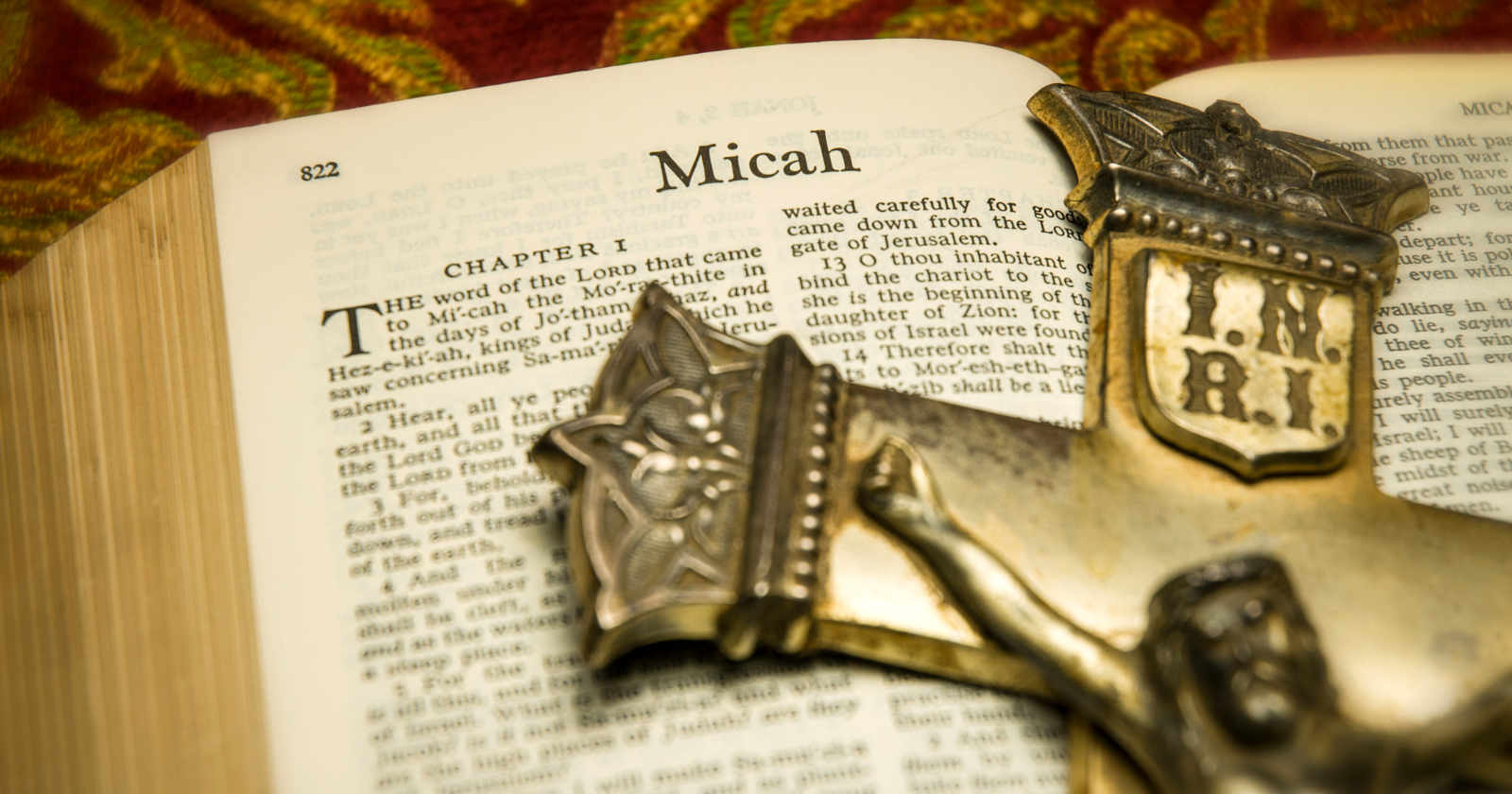“He has shown you, O mortal, what is good. And what does the Lord require of you? To act justly and to love mercy and to walk humbly with your God.”
Micah 6:8
How often do we pause and consider the foundation of a just and compassionate society?
The teachings of prophet Micah, though centuries old, shed light on this very question, offering profound insights into living with purpose and integrity.
In essence, Micah’s message is a clarion call to action — urging us to embrace justice, exercise mercy, and walk humbly with our Creator.
As we navigate the complexities of modern life, the lessons from the Book of Micah stand as timeless reminders that true change begins within ourselves and extends outward, touching the lives of those around us.
Who was the prophet Micah?
Micah of Morasthi was a contemporary of Isaiah in the Southern Kingdom of Judah during the period of the Divided Kingdom.
His name means “Who is like the Lord?”
Unlike the major prophets whose works spanned volumes, Micah’s messages were concise but no less impactful, earning him a place among the twelve minor prophets in Hebrew Scripture.
His prophecies, notably concerning the downfall of Zion and the promise of the Messiah’s birth in Bethlehem, resonate through time, challenging us to consider the depths of justice, mercy, and humility.
Specifically, the prophecy of Micah on the destruction of Zion and Jerusalem was referred to in the Book of Jeremiah 26:17-18. Micah 4:1-2 is an important prophecy on the end times.
On the other hand, Micah 4:8-10 refers to Daughter Zion, the woman in travail, who anticipates the Woman in Revelation 12
Overview of the Book of Micah
The Book of Micah, an exquisite blend of poetry and prophecy, serves as a timeless call to action and reflection.
Its chapters traverse the themes of judgment and restoration, painting a vivid picture of a society in need of redemption.
Micah’s world was one of contrast — between the rich and the poor, the powerful and the powerless. Yet, at its core, Micah’s message was one of hope.
With famous verses like Micah 5:2, predicting the humble origins of the Messiah, and Micah 6:8, a verse that distills the essence of what it means to live rightly — justice, mercy, and humility — Micah offers a vision for a future where peace and righteousness reign.
Thus, this book not only recounts the failings of its time but also forecasts the dawn of a new era, anchored in the mercy and justice of God.
6 core lessons from Micah
1) Justice is more than an ideal
How often do we view justice as a lofty concept rather than a tangible action we can take every day?
Micah shatters this notion, challenging us to see justice as an active pursuit, not just an abstract ideal. He calls on us to not only champion justice in big movements but to weave it into the fabric of our daily lives.
Whether it’s standing up for someone who’s being treated unfairly, or lending a hand to those who are downtrodden, Micah reminds us that our quest for justice begins with the choices we make every day.
How so?
Well, he points out exploitation, corruption, and social injustices that have led society astray from God’s path.
Micah’s message is raw and honest, serving as a mirror to society’s soul, reflecting the ugliness of their deeds.
It’s a call to recognize how far they have veered off course, highlighting the need for societal change and a return to ethical living that aligns with God’s commandments.
2) Mercy should be at the core of our actions
Now, let’s talk about mercy.
In a world that often prioritizes justice and retribution, Micah presents a compelling counter-narrative: mercy should be the bedrock of our actions.
But what does that look like in practice?
It means looking beyond our own judgments to see the needs and struggles of others. It’s about offering forgiveness instead of holding on to grudges, showing compassion instead of indifference.
Micah’s verses on love and mercy are a call to action for each of us, urging us to let mercy guide our interactions with everyone we meet. After all, in showing mercy, we reflect the very heart of God.
That’s why I want you to pause and think about this: how will you let mercy shape your actions today?
3) Walking humbly with God is essential for a fulfilled life
Humility isn’t just about being modest — it’s about recognizing our place concerning God and others.
Micah champions the call to “walk humbly with your God,” emphasizing that a truly fulfilled life isn’t found in accolades or achievements but in a humble walk with the Lord.
This journey involves listening more than we speak, serving more than we are served, and loving God and others genuinely. Imagine the impact of such humility in today’s world, where pride often takes the front seat.
Walking humbly with God redirects our focus from self to service, leading to a life of purpose and peace.
4) Change starts with a few
Micah emphasizes that significant change doesn’t always require grand actions by the masses.
Sometimes, it starts with the few or even the one — like Bethlehem, small among the clans of Judah, from which comes the ruler of Israel.
This idea challenges our often grandiose visions of change and revolution. It suggests that greatness and influence can emerge from the most humble origins or actions, reminding us that every effort counts in God’s plan.
For example, consider the impact of a small community group that decides to address local needs through acts of kindness, justice, and humility.
Their efforts can inspire others, creating a ripple effect far beyond their initial scope.
5) God desires our faithfulness more than ritual sacrifices
“He has shown you, O mortal, what is good. And what does the Lord require of you? To act justly and to love mercy and to walk humbly with your God.”
Micah 6:8
This passage beautifully captures the essence of what God truly desires from us:
Not the grandeur of our offerings, but the sincerity of our actions and the depth of our faithfulness.
It’s a gentle yet powerful reminder that our relationship with God isn’t about the rituals we perform, but about living a life that reflects His love and justice.
The thing is that Micah presents a profound message that shifts the focus from the external acts of worship to the heart’s commitment.
Think about it:
Are you living in a way that aligns with what is good?
There’s no doubt that this question prompts self-reflection in our daily lives.
Micah distills down the essence of a life pleasing to God into these three actions: justice, mercy, and humility.
6) The power of God’s forgiveness
Despite its strong theme of judgment against sin, Micah ultimately underscores God’s preference for mercy over judgment.
The book closes with affirmations of God’s forgiveness, love, and faithfulness to His covenant.
“Who is a God like unto thee, that pardoneth iniquity, and passeth by the transgression of the remnant of his heritage? He retaineth not his anger forever, because he delighteth in mercy” (Micah 7:18).
Through these words, Micah reassures us of the transformative power of God’s forgiveness.
This theme is vital for understanding the character of God as portrayed in Hebrew Scripture—not as a vengeful judge eager to punish but as a loving father keen to restore His children when they stray.
It makes us realize that forgiveness is not just a reset button but a call to growth and renewal.
Micah’s vision for society
Micah’s vision for society is both profound and forward-thinking, encapsulating ideals that resonate deeply even today.
At the heart of his message, captured in the Book of Micah, is a call for justice, mercy, and humility — a triad of principles that, when embraced, have the power to transform communities and societies at their very core.
- Justice: He challenges us to weave justice into the fabric of our communities, ensuring fairness for all. This involves actively dismantling systems of oppression and inequality, embodying the call of Micah 6:8 to “do justly.”
- Mercy: Micah envisions a society rich in compassion, where mercy permeates every interaction. He urges us to embrace forgiveness and understanding, creating an environment where all can thrive.
- Humility: Walking humbly with God is foundational, guiding us to listen, serve, and value others. This humility is about recognizing our reliance on divine guidance and the worth of every individual.
In essence, Micah’s vision is a call to action — a challenge to live out these values daily, fostering a world that mirrors the justice, mercy, and humility of God’s kingdom
Applying Micah’s teachings in the 21st century
As you can see, the Book of the Prophet Micah offers profound insights into God’s character and His expectations for His people.
In an era often marked by division, injustice, and indifference, Micah’s call to “do justly, love mercy, and walk humbly with your God” (Micah 6:8) offers a timeless blueprint for living.
Here’s how we can bring these ancient principles to life today:
- Seek Justice in Everyday Life: Advocate for fairness in your community, workplace, and society. Support causes that fight inequality and stand up for those who are marginalized.
- Show Mercy and Compassion: Extend forgiveness and understanding to others. Volunteer your time, resources, or skills to help those in need, embodying the mercy that Micah champions.
- Embrace Humility: Cultivate a lifestyle of humility by listening more than you speak, considering others’ needs as important as your own, and seeking guidance and strength from your faith.
By integrating these principles into our daily actions and decisions, we honor Micah’s vision and contribute to a more just, compassionate, and humble world.













